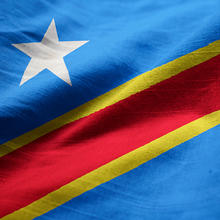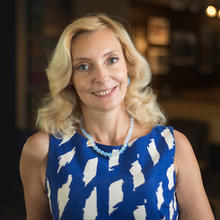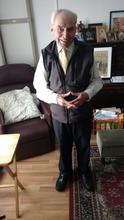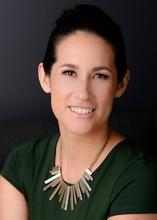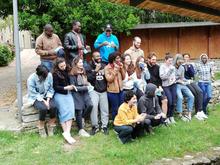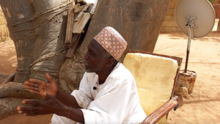Dr. Danielak is an assistant professor at the Carter School whose research focuses on urban and environmental peacebuilding, UN peace operations, as well as conflict and security in the context of climate adaptation, energy transition, and infrastructure building.
Dr. Saldadze teaches conflict analysis and resolution classes at Mason Korea. His research interests are focused on the conflicts and political transformation in Eastern Europe and Central Eurasia.
Assistant professor of Conflict Analysis and Resolution at George Mason Korea specialized in peace, human rights and citizenship education and educational sociology.
- February 20, 2023
It’s been a year since George Mason University’s Carter School for Peace and Conflict Resolution touched base in the war-torn Democratic Republic of the Congo. Their goal? Accompany locals in creating their own sustainable peace—something the country has not experienced in more than 30 years.
Carter School Dean Alpaslan Özerdem, and Charles Davidson, PhD ’19, Carter School research faculty and alumnus, visited the Congo in October 2022 to check in on the “Peacemaking + Initiative,” funded by Milt Lauenstein, and assess the direction for its next phase.
- March 4, 2022
The ongoing war in Ukraine is unique from other conflicts, and the international community can take five actions to control the situation, said Karina Korostelina, professor and director of the Program for the Prevention of Mass Violence at George Mason University’s Carter School for Peace and Conflict Resolution.
Korostelina shared her perspective over Zoom:
- July 23, 2021
Students and faculty from the early days of the Center for Conflict Analysis and Resolution (CCAR), the center that later became the Carter School, will undoubtedly recall Joe Camplisson, who passed away in his native Belfast on Friday, July 9, 2021, at the age of 92.
- June 22, 2021
Though several public opinion polls have shown a decrease in support for the Black Lives Matter Movement year after the murder of George Floyd, the political victories gained by the movement’s earlier momentum will set the stage for what’s next, said Carter School professor Tehama Lopez Bunyasi.
“#BlackLivesMatter and the Movement for Black Lives have played critical roles in not only shaping our contemporary discourse on racism, but we have seen how those mobilized in concert with this movement have brought about important electoral victories,” Lopez Bunyasi said. “This racial justice movement endures and evolves alongside a countermovement that seeks to restrict who participates in our democracy and what stories get told about our country.”
- June 10, 2021
Can enemy groups learn to develop compassion for one another? That was the question Carter School professor Daniel Rothbart set out to answer in his research at Rondine, a two-year “laboratory for peace.” Now, the results are in.
“This is the first in-depth case study of compassion among civilians who live in conflict zones,” said Rothbart, who collaborated with George Mason University professors Thalia Goldstein, Marc Gopin and Karina Korostelina. “We hope this is a model that can help create new practices for peacebuilders to cultivate compassion.”
- May 18, 2021
Following decades of war and genocide in Sudan, in April 2019 a mass movement from civilians overthrew the dictatorship of Omar al-Bashir. As the country transitions to democratic rule, George Mason University’s Carter School for Peace and Conflict Resolution is working to empower civilians to use their voice to impact the future.
The Mason team, working with partners in Sudan, has been interviewing and video recording oral histories of 100 Sudanese civilians who have lived through both war and peace. Their answers, which expand upon their experiences, also include their vision for a just Sudanese society.
- May 13, 2021
The COVID-19 pandemic has made it so most museums are closed, but students and researchers at George Mason University’s John Mitchell, Jr. Program (JMJP) are working hard to create a digital one that sheds light on civil rights pioneers with largely untold stories.
Thanks to an $8,000 grant from Virginia Humanities, the team is building a digital exhibit on the life of anti-lynching advocate John Mitchell, Jr., and his colleagues Frederick Douglass and Ida B. Wells. The grant is part of $181,500 in funding awarded to 25 nonprofits.

